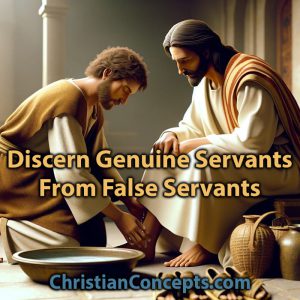Genuine servants will inherit God’s kingdom; false servants receive nothing but ongoing suffering. Therefore, knowing what distinguishes a true servant from a false one is of utmost importance.
Matthew chapter 25 illustrates the differences between genuine and false believers. A careful interpretation of Jesus’s parables will show the contrast between these two groups. God’s plan for life and redemption focuses on sorting people by their conversion status.
True Servants are Active
In the parable of the ten virgins (v. 1-13), the five faithful virgins act decisively on their convictions. They know God is real and prepare accordingly.
In the parable of the talents (v. 14-30), the two faithful servants also act decisively. They use the abilities God has given them, having the faith to produce results.
During the final judgement (v. 31-46), the sheep actively lived out their faith by ministering to others.
False Servants are Passive
In the parable of the ten virgins (v. 1-13), the five foolish ones lacked conviction. They could not see the reason to be prepared until it was too late to avoid destruction.
In the parable of the talents (v. 14-30), the fearful servant lacked understanding. Being an imposter, he did not know how to use his talent. So he could only make excuses when the master returned.
Finally, during the final judgement (v. 31-46), the goats did nothing to demonstrate the genuineness of their faith–because they had none.
Jesus Contrasts His Servants
I agree with most of Oliphant’s writings, but occasionally he misinterprets scripture, as with Matthew 25:14-30. According to him, all three servants are believers, with God only disciplining the third servant for his lack of productivity.
Let us inquire what is meant by this parable. It is used to define something about the kingdom of heaven, the church. And, by a little thought, you will observe that they were his servants, without these talents; for, “He called his own servants to him and delivered to them his goods.” Then, if they were his servants before they received the talents, they were not the servants of the wicked one; consequently, these talents were some gifts or graces he bestowed, not to make them his servants, or according to their needs, but “according to their abilities.”
Oliphant page 101
However, there are several reasons this interpretation isn’t the best:
- Every person God has created is a servant. A person can be a servant, but not be saved.
- The place of “outer darkness with weeping and gnashing” is most often used to describe the place of eternal torment.
- The context of this parable is between the other two parables, which make sharp contrasts between the eternally saved and the eternally condemned.
- The master calls the servant “wicked.”
But his master answered him, ‘You wicked and slothful servant! You knew that I reap where I have not sown and gather where I scattered no seed? Then you ought to have invested my money with the bankers, and at my coming I should have received what was my own with interest.
Matthew 25:26-27 ESV
The master cuts right through the excuses to expose the true condition of his heart. A genuine believer would have at least invested the money to collect interest. But this man had a wicked heart that resulted in slothful behavior. He had no care or concern for building God’s kingdom.
I certainly agree with Oliphant in his conclusion, that a truly saved person cannot lose his salvation. But in this case, we differ on what the scripture teaches. Either way, the point is that Matthew 25 does not teach that a person can lose salvation. It teaches that true believers will naturally act on the faith that God provides, while false believers, those who only profess Jesus in name, will not act for the simple reason that they do not hold enough conviction to motivate them to action.
What are we to do with such tough parables? True believers do not need to panic because they will consistently desire to grow God’s kingdom. They can be discouraged, but not without the hope of eternal life. They can be unproductive for a season, but cannot help but bear fruit because they are connected to the true vine. All you need to ask yourself is, “Am I willing to use whatever God has given me to serve His purposes?” God then works in the willing heart to produce many times over in fruitfulness.
This is post 21 in a series; you can read the previous post.
https://www.bibleref.com/Matthew/25/Matthew-25-30.html
https://archive.org/details/doctrineoffinalp00olip/page/100/mode/2up
Image by Karen .t from Pixabay





